This Blog is about analyizing Chinese film Directors and the analysis of their film.
Don't wanna be here? Send us removal request.
Text
War Kar-Wai and Chung King Express: Hong Kong Identity Crisis
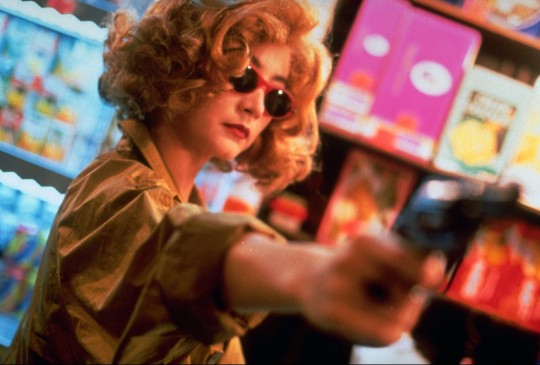
Chungking Express is a movie that revolves around two love stories that never really ended in a typical happy ending. At first glance, Wong Kar-Wai made this film to be a film truly about loneliness and seclusion. However, when you look at the film aesthetics and techniques that Wong Kar-Wai used these techniques to describe Hong Kong and its identity crisis ever since it became an independent nation. These film techniques are hidden well as they help progress enhance the characters’ actions and advance the plot, yet it subtly takes these representations to visually describe the hardships of Hong Kong.
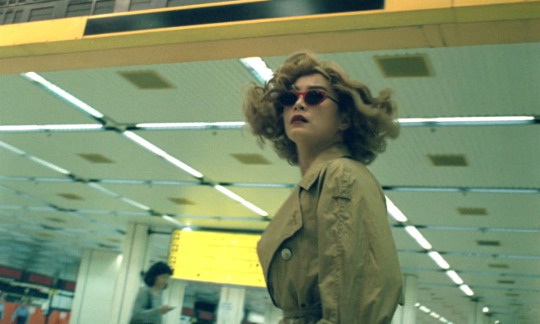
One of the film aesthetics/technique that Wong Kar Wai uses is constant hand held shots to simulate the viewer being inside the film. However, these hand held shots are noticeably shaky to represent how Hong Kong was trying to adapt to their new independency. As you watch the film, you notice that there are many things that are wrong with Hong Kong as there are many immigrants trying to find work and a lot of drug smuggling. The shaking camerawork emphasizes the unstable environment that Hong Kong is in during this adjustment period.
Another film aesthetic/technique that Wong Kar-Wai used to show Hong Kong’s identity crisis is the distortion of time and transitions that are blurred to show that Hong Kong is lost in time. An example of this is when in the second arc where Cop 663 is waiting for Faye at the California Bar and he is at the juke box. There is a passing of time where he is moving slowly yet everything else in the background is sped up, almost like a stop-motion time lapse. This part expresses the feeling of lost time as the world moves on when Cop 663 is waiting for change. This is also reflected how Hong Kong with its new independency is now lost in this time where the world is progressing while Hong Kong is trying to grasp the new concept of independency.
The final film aesthetic/technique that Wong Kar-Wai uses to show the identity crisis of Hong Kong is the constant use of western culture in the film. One example of this is the mysterious blonde woman in the first arc is being depicted. She wears what is typically known to be western clothing and have a western hairstyle. Yet, at the end of the first arc, the lady is revealed to be wearing a wig. Another example is in the second arc where Faye constantly talks about wanting to go to California and plays the song California Dreamin in almost every part of the movie. Fun fact, the actor who plays Faye also wrote a Chinese version of this song. Wong Kar-Wai uses these western aspects to show how Hong Kong is struggling to find and identity during this transition period of independency.
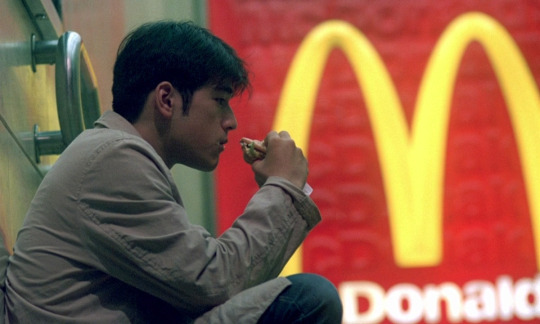
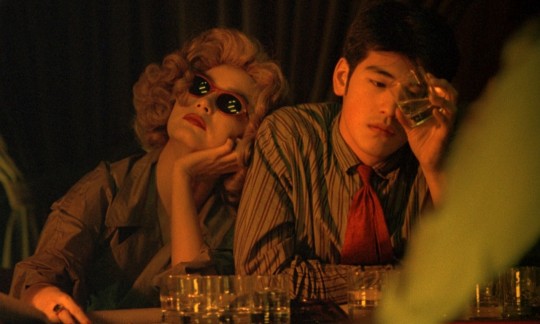
If you guys like me to do more films and analyze them, let me know! I have fun doing this every once in a while and I need some new ideas.
2 notes
·
View notes
Text
Ang Lee and his Trilogy
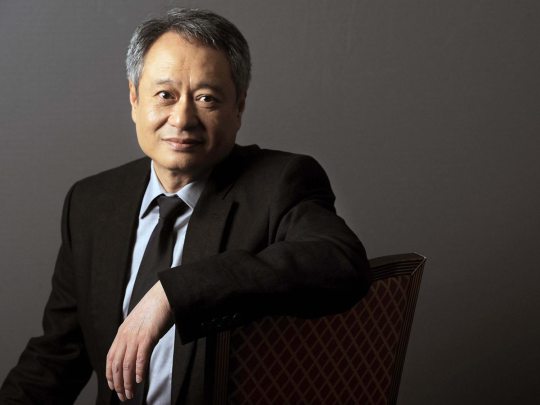
Ang Lee is a director who is well known for his big Hollywood films like Brokeback Mountain, Life of Pi, and Crouching Tiger and Hidden Dragon. However, how he was able to create these masterpieces is because of his famous trilogy of “Father Knows Best” film. Ang Leeʻs The Wedding Banquet, Pushing Hands, and Eat Drink Man Woman are films that have different takes on “Father Knows Best” as each film is set to tackle cultural and social issues and how it ties back to the family. In this blog post, I will be analyzing each filmʻs theme in regards to Ang Leeʻs “Father Knows Best” trilogy and how it also relates to todayʻs issues and the generation gap between first and second generations of families.
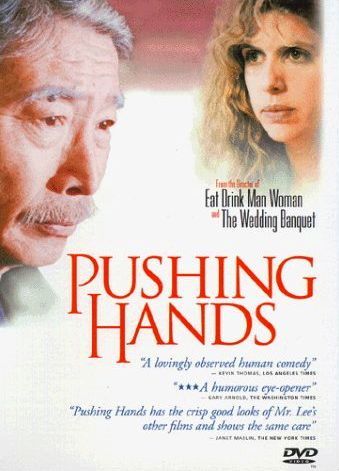
Letʻs look at Pushing Hands first as this is the first film in the trilogy. The premise of the film is about this old Chinese man is living in America with his son, Caucasian daughter-in-law, and grandson. The theme for this “Father Knows Best” film is focused on the clash between Western culture and Eastern culture as Mr. Chu (The old Chinese man) lives a different lifestyle compared to the daughter-in-law. An example of this clash can be seen when the family has a dinner together. Mr. Chu comments on how his daughter-in-lawʻs “yin and yang” isnʻt balanced as she only eats vegetables and no meat. His son Alex explains that she is trying to lose weight as she is trying a diet. It can be also seen when both Mr. Chu and the daughter-in-law both give pieces of food to the grandson as there is a power struggle between how the grandson should be raised. This is emphasized when the two of them argue on what the grandson is watching on T.V. as Mr. Chu wants the grandson to study while the daughter-in-law wants to use it as a distraction for the grandson. The constant struggle reflects on how Ang Lee came to America and was indirectly split between Western and Eastern Culture when he was studying film at New York University. But I also believe that Ang Lee reflects even modern day raising of second generation children due to me personally having parents who are old fashioned with raising me like Mr.Chu by making me study my own language and traditions. While I also have aunties and uncle who supported me in a more Western fashion by giving me more freedom when it comes to what I want to do.

Looking at the second film in the trilogy, The Wedding Banquet focused on the social issues of of LGBTQ+ in Taiwan. The premise of the film is about this gay guy Wai-Tung is living with his significant other Simon in Manhattan and Wai-Tung has to hide the fact he is gay from his parents so he setʻs up this ploy to trick his parents that he is straight. This film theme is shown through the aesthetics of Wai-Tungʻs apartment being changed from his homosexual content in his home to a traditional Chinese decor. The reason why he does this is because of how Taiwan during the time period did not accept gay marriage. Wai-Tungʻs father expects his son to be a perfect and successful person with a wife who is Chinese and well rounded. Ang Lee does this well because he shows how the younger generation wants to be free yet they want to make their parents happy. Yet, Ang Lee also shows the happiness of the father in the family as in The Wedding Banquet, Wai-Tungʻs father is revealed to know about the secret between Wai-Tung and Simon and admits he is happy to just have a grandchild coming.
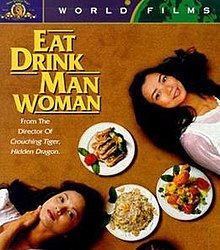
Looking at the final film in the “Father Knows Best” Trilogy (and my personal favorite) Eat Drink Man Woman is very different from the first two films as it is set in Taiwan. The theme of the film is focused on the theme of family the father wanting give his daughters the best life possible. What sets this film apart from the first two is that Ang Lee focuses on the food culture in Chinese culture as he states in his interview that “the food and the banquet is a ritual” for the family. Every scene where the father and his daughter eats dinner there is always arguments. This does lead to each consecutive dinner ending up with one of his daughters leaving the family until he is left with the middle daughter. This represents the breaking down of familial bonds as dinner in Chinese culture is an important part of family as it is when everyone is together and sharing food with one another. Though the ending of the film had only the middle daughter and the father eating dinner together, it ends on a sweeter note as he regains his sense of taste, in a way regaining his happiness in cooking and in turn the familial bond of having dinner with a family. This film is the first film Ang Lee filmed at his home country of Taiwan and the focus on food on this film and the bond to family was extreme when he directed this. In his interview he talks about how he had to have back up food for multiple takes just in case there was a mistake in the shot. The reason why I believe that Ang Lee did this is because he wanted to get the fact that food in Chinese culture and how they are prepared represents the bonds of the family as each food item is prepared with precision and carefulness which is similar to raising a child. From my experience as a Vietnamese person, my family has a strong bond to dinner and having that family dinner at the table and talk about our day is important to bond together.
Thank you for reading this analysis on Ang Lee and his “Father Knows Best” trilogy film and how he shows it differently in each film. If you want to know more about his interview with Eat Drink Man Woman, here is the link at the bottom of the blog. If you guys want me to do more of these analysis on different Chinese directors, message me!
https://www.youtube.com/watch?v=efDFSqvBgoI
0 notes